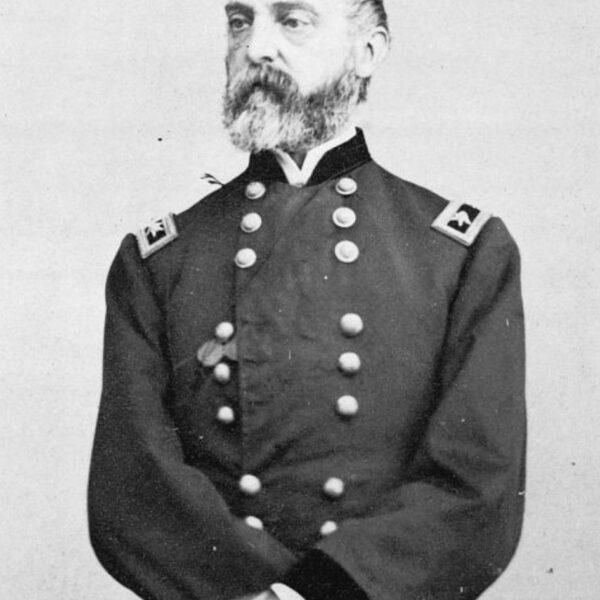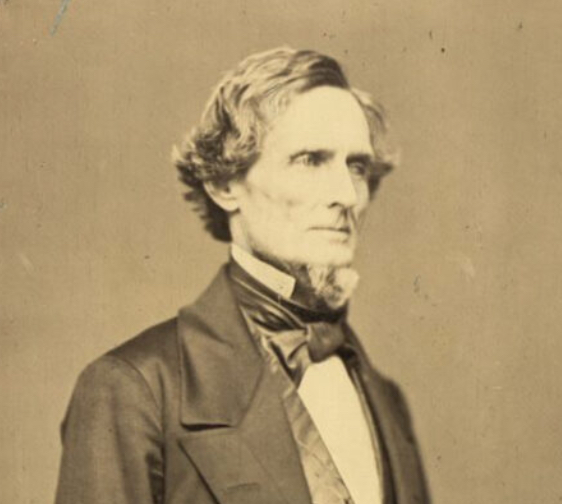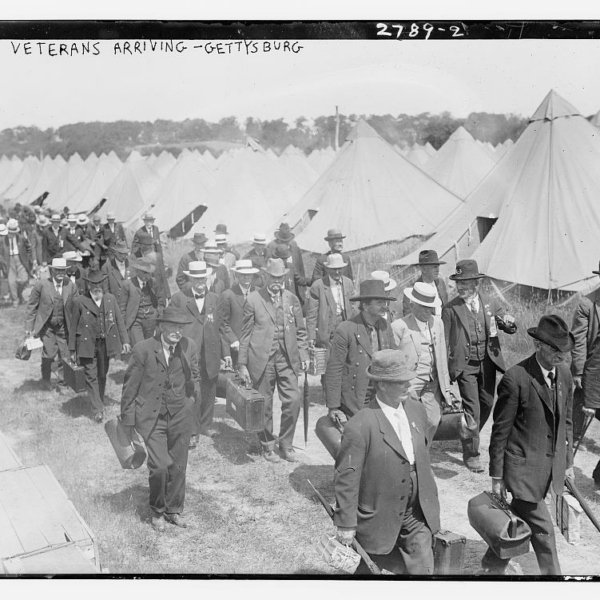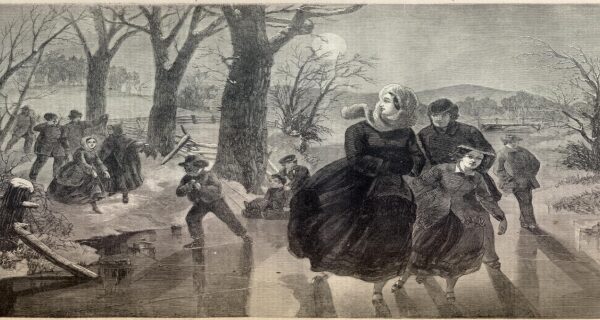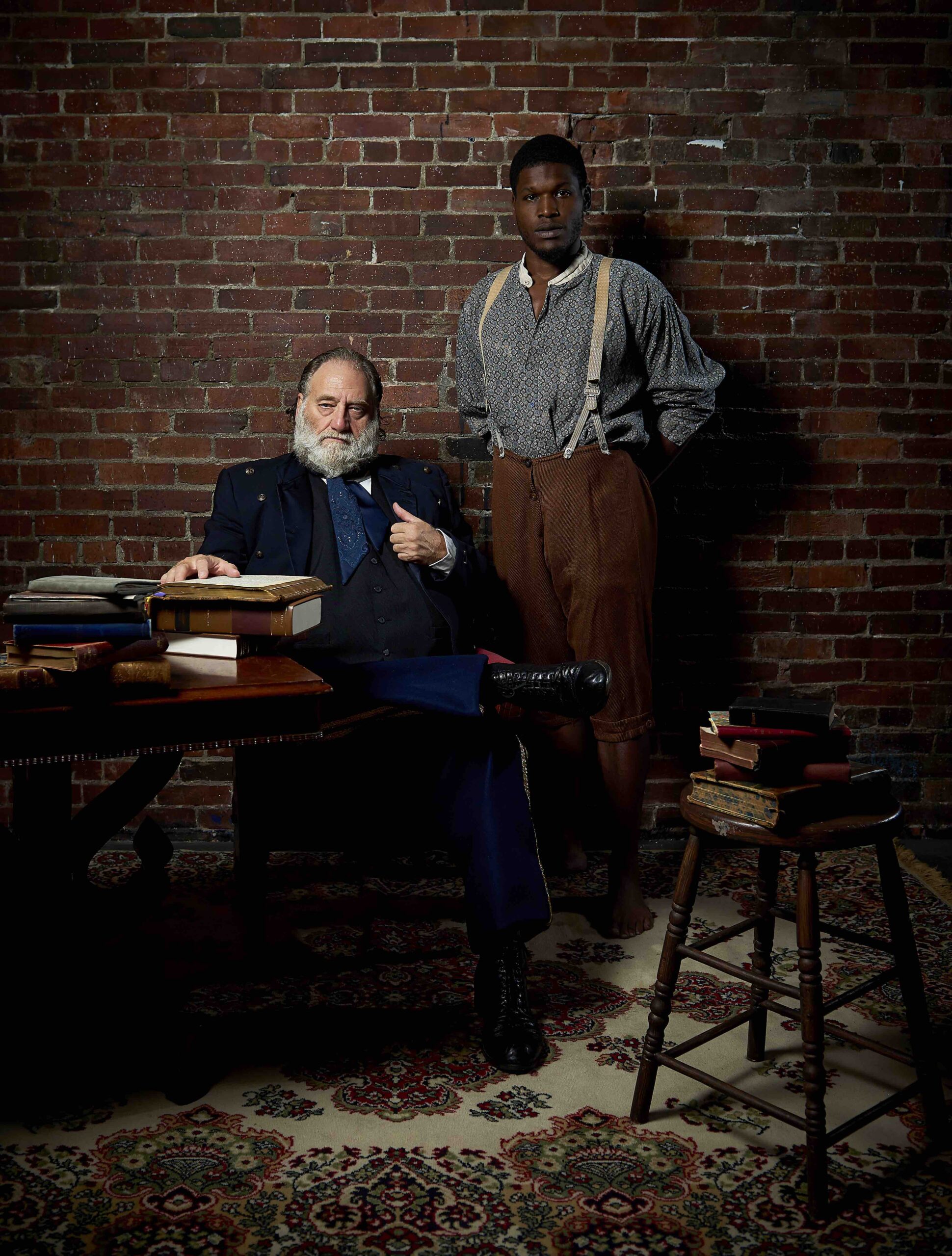
Ron Orbach (left) plays Major General Benjamin Butler and Cornelius Davidson portrays Shepard Mallory, an enslaved man who has taken refuge in Union-held Fortress Monroe, in “Ben Butler,” a new play by Richard Strand.
One weekend last October, my husband and I drove several hours to Portland, Maine, to see a play about lawyer and Civil War general Benjamin Franklin Butler. The stage was stacked with moving boxes, a rolled-up rug, several pieces of unhung artwork, and a large desk piled with papers. Brickwork archways soared overhead, bolstering the stage roof. Ben Butler, by playwright Richard Strand and staged by Portland Stage, takes place in Butler’s headquarters at Fortress Monroe, a Union-held installation on the tip of the Virginia Peninsula in Chesapeake Bay. The play is set in late May 1861, mere weeks after Butler was appointed major general in the Union army and sent to command the fort.
The play opens with a series of rapid-fire exchanges between Butler (Ron Orbach) and his aide, Lieutenant Kelly (Michael Dix Thomas), which establish Butler’s short temper and quick wit. He objects to his subordinates’ use of the word “demand” when asking for things—noting that only his wife may make demands on him. Butler’s close readings of words and their multiple meanings is one of his skills as a lawyer. And of course, there are several jokes about Butler’s profession. My husband, who is also a lawyer, was grimly amused and not at all surprised. (“Everybody loves a lawyer joke,” he said.)
Butler verbally spars with Kelly, and then with Shepard Mallory (Cornelius Davidson), an enslaved man who, with two friends, has rowed over to Fort Monroe to offer his labor and allegiance to the Union. These arguments are a comedic device, but they also reveal that verbal wit can be politically powerful. After seeing the play, Civil War historian Elizabeth Leonard pointed out, “It made perfect sense to have the dialogue be so rich in wordplay, because in the end, one could argue, it was his superiority in wordplay that enabled Butler to launch his contraband policy.”
The arrival of Mallory and his friends also enables the introduction of that policy, and Strand writes several scenes in Ben Butler that reflect the turn in Civil War scholarship toward studies of how enslaved people resisted their enslavement or emancipated themselves in wartime. Mallory not only escapes to Fortress Monroe, he can also read, as he unintentionally reveals to Butler. In a pivotal scene, he shows his back to the major general, whose reaction suggests that Mallory’s back is puckered with whip scars. All of these details, Elizabeth Leonard observed, “provide a respectful artistic substitute for the long, hard history of slaves’ efforts towards self-emancipation.”
And yet the play is not entitled Shepard Mallory. Benjamin Butler remains the central figure in this story of the creation of the Union’s contraband policy, and the other three characters—Kelly, Mallory, and Major John B. Cary (Corey Gagne as a Confederate officer who comes to retrieve his commander’s enslaved men)—are his foils. Butler’s interactions with each of them push him toward his Fort Monroe Doctrine: He refuses to return Mallory, Frank Baker, and James Townsend to Cary on the grounds that because Virginia seceded from the Union, he was not bound under the Fugitive Slave Act to turn them over—and that because these enslaved men were used to build Confederate fortifications, the Union army could lawfully confiscate them as war materiel, declaring them “contraband.”
It was Butler’s motives for his famous “contraband decision” that first intrigued Richard Strand. After reading books and articles including Eric Foner’sThe Fiery Trial (2010) and Adam Goodheart’s 1861: The Civil War Awakening (2011), the playwright was not satisfied with their accounts of Butler’s actions.
“I created a fictional explanation in the form of my play,” he said.
Strand, whose previous theatrical works do not often wander into the historical realm, felt a degree of freedom writing the scenes between Butler and his three foils.
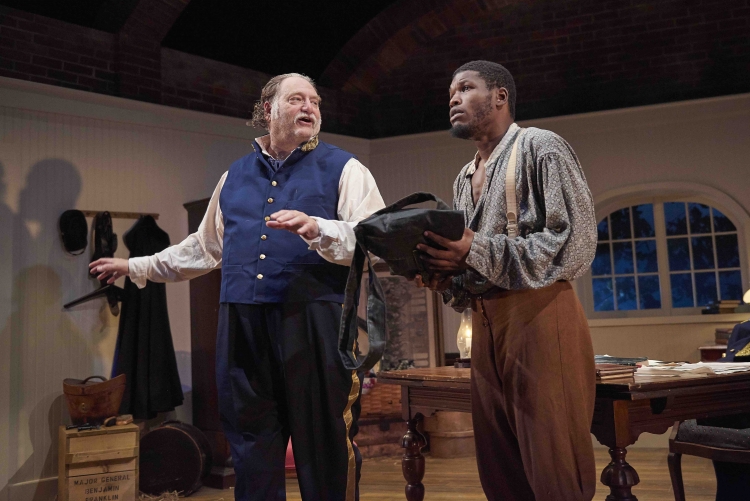
Ron Orbach (left) and Cornelius Davidson in a scene from “Ben Butler”
“Some playwrights are attracted to historical events about which a great deal is known,” he explained. “Some playwrights are attracted to incidents where little has been reliably recorded. I fall into the latter category. I can’t see that anyone knows what, if anything, transpired between Shepard Mallory and Ben Butler. That opened up a lot of space for me to create the bulk of my play.”
Although almost all of the dialogue in Ben Butler is fictionalized, much of it rings true, according to accounts of that early period of the war and Butler’s reports of his actions. There were audience members, however, who were not sure what was fact and what was fiction. “Did any of this really happen?” one woman asked her brother while waiting in line for refreshments at intermission.
I could not help but intervene, of course, and the ensuing conversation suggested that Ben Butler could have done with a little more contextualization. The front page of the play’s program reveals only that the time is “May 1861” and the place is “General Butler’s office inside Fort Monroe, Virginia.” For most Americans—even theatergoers in Portland, Maine—neither of these details is wholly suggestive of the status of the war at that moment, or the question of slavery and emancipation in the upper South. There is material that explains some of this context later in the program, but audience members clearly wanted to know more. The family from the refreshment line sought me out after the play and peppered me with more questions about Butler, Virginia, and the war itself.
In the end, Ben Butler is an engaging and edifying play. It is also a comedy about emancipation, which can be a hard sell and makes the play’s moments of seriousness—the revelation of the whip scars and two instances in which white men point guns at an unarmed black man—even more unsettling. Ultimately, Ben Butler reveals both the possibilities and the challenges of both fictionalizing history and staging the rich and complex process of emancipation.
Megan Kate Nelson is a writer living in Lincoln, Massachusetts. Her book about the Civil War in the desert Southwest, which won a 2017 NEH Public Scholar award, will be published by Scribner in 2020.
This article appeared in the Winter 2018 issue of The Civil War Monitor.

